- Home
- Keith R. A. DeCandido
Genesis Page 2
Genesis Read online
Page 2
Mahmoud al-Rashan was one of Lisa’s coworkers at Citibank. He had also been a close friend, always lending a sympathetic ear when she and Nick were having their problems. When Nick started neglecting her after his mother died, Mahmoud was there for her to talk to. When she decided to leave him, Mahmoud and Fadwa offered their couch until she could get her own place, and both helped navigate the real-estate minefield that was apartment-hunting in New York City. And Mahmoud had been great about recommending her for contract work after she went freelance.
In turn, Lisa had been there to help comfort him when what should have been a simple surgical procedure on an ulcer in his stomach turned into something worse, and the drugs prescribed to alleviate the post-surgical complications served only to exacerbate the problems.
Mahmoud’s lawyer had urged him to sue, a decision Lisa had supported. However, the hospital was not the only target of the suit. The surgeon who had operated on Mahmoud was employed by a service called RPC—the Reserve Physician Corps—which provided supplemental medical staff for overburdened hospitals. The equipment used in the surgery—which was, according to the expert hired by Mahmoud’s lawyer, substandard—was supplied by Caduceus Medical Supplies, and the bad drugs they prescribed were supplied by Armbruster Pharmaceuticals.
RPC, Caduceus, and Armbruster were all subsidiaries of the Umbrella Corporation.
Three things happened between Mahmoud filing the suit and the arrival of the first settlement check:
First, the al-Rashans found themselves the subject of a brutal IRS tax audit. They came through with a clean financial bill of health from the government—both Mahmoud and Fadwa had always been meticulous with their finances—but the process itself was excruciating, and did nothing to aid Mahmoud’s failing health.
Then Mahmoud’s gung-ho lawyer abruptly switched from wanting to roast Umbrella on a litigational spit to urging Mahmoud to settle. He never explained the reasons for his change of heart, but they all had their suspicions, especially after all was said and done and he took a very long vacation to Europe.
Finally, Mahmoud died from post-operative complications.
The Umbrella Corporation had, for all intents and purposes, murdered Lisa Broward’s friend, and gotten away with it by writing a check to his widow.
Fadwa was bound by a gag order that was part and parcel of the terms of the settlement. Strictly speaking, Lisa wasn’t bound by it, but all the details she knew were hearsay, and any attempt to reveal the truth would only give Umbrella the excuse they needed to ruin what was left of Fadwa’s life.
So when Matt came to her with an opportunity to pay the bastards back, she took it. It didn’t matter if it meant a commitment of time that might number in years. It didn’t matter if she risked her life. It didn’t matter that she risked provoking the ire of a corporation for whom forcing an IRS audit was the mildest of weapons in the arsenal they could call to bear on the average citizen.
With the divorce final, and Nick off contemplating his navel or whatever it was he decided to do with his life now that his mother was dead, Lisa had no family to concern herself with. They had never had kids—for which she was now eternally grateful, as the divorce had been ugly enough without that factored in.
She was free and clear to exact her revenge on the sons of bitches who murdered her friend.
Any time she had any doubts, she thought about Fadwa.
After that, it was easy.
Let them move her into an underground complex a thousand feet beneath Raccoon City. Let them only allow her occasional trips to the surface. Let them force her to spend ninety percent of her life in a hole providing maintenance and upgrades on their computers’ security systems, allowing them to keep their precious secrets from an inquisitive world.
Let them give her access. Because with that access would come her revenge.
“All right, then,” Acker said, clapping his pudgy hands together. It sounded like someone playing a percussion riff on a ham. “I guess that just leaves us to fill out all the paperwork. I gotta tell you, though, there’s a lot of it. NDAs, employee contracts, the whole nine yards, y’know?”
Once again plastering a smile onto her face, Lisa said, “Bring it on, Mr. Acker. I’m ready to join the Umbrella family.”
Acker returned the smile. “Glad to hear you say that, Ms. Broward. Trust me, you won’t regret this decision.”
She didn’t, but not for the reasons Casey Acker thought . . .
THREE
WHEN ALICE ABERNATHY WAS A LITTLE GIRL growing up in Columbus, she had imagined that getting her wedding picture taken would be a glorious moment of joy. She’d be surrounded by friends and family, a band playing her favorite music, and tons of food and drink. Dressed in a beautiful white dress, her prospective husband in a tuxedo (it had to be a tuxedo—she’d never marry a man who wouldn’t get married in a tuxedo), they’d stand as close to each other as they could, reveling in the feel of their embrace, while the photographer said something ridiculous like, “Say cheese!”
The moment of pure happiness would be frozen forever in that photograph.
The mansion on the outskirts of Raccoon City was a long way from Ohio, both physically and metaphorically. Two-and-a-half decades removed from that childhood fantasy, Alice found herself in the white dress embracing a man she barely knew as a photographer employed by the Umbrella Corporation muttered something noncommittal and snapped another photograph.
At least her “husband” was wearing a tuxedo.
It was all part of their cover. Alice had taken over as the head of security for the Hive, the semi-secret underground facility owned and operated by the Umbrella Corporation. However, the promotion came with a new assignment. The person who ran security for the Hive had to spend the first three months of the job with what was considered either the best or worst assignment in Umbrella’s Security Division: mansion duty.
The mansion—a massive estate that felt to Alice like it belonged in a museum or a Jane Austen movie rather than a suburb of a small American city—was located in the neighborhood of Foxwood Heights, two miles outside the Raccoon City limits.
Raccoon itself only had an official population of approximately 853,000, including the five hundred employed by Umbrella who lived and worked in the Hive. The existence of the Hive was not kept a secret—it was impossible to sequester away five hundred employees, many of whom were in the upper echelons of their respective fields, without someone noticing they were missing—though it was not widely advertised either. Umbrella kept its public headquarters in downtown Raccoon where everyone could see it: the public face of the company that provided the best computer technology and health-care products and services in the country.
Part of Alice’s job—and that of her fictive husband—was to keep the public from knowing any more than that.
Mansion duty meant posing as the couple who lived in that weird old mansion that all the guides to Raccoon cautioned against tourists visiting. Although an architectural marvel—built by an eccentric old millionaire in the 1960s—and rumored to be filled with trap doors, secret corridors, and other reflections of the millionaire’s obsession with spy thrillers, it was currently occupied by a reclusive couple who did not appreciate strangers knocking on their door and asking to see their house. More than one nosy visitor had found themselves escorted out of the area by the Foxwood Heights Police Department—or even sometimes the Raccoon City P.D.—for trespassing.
That couple’s reclusive tendencies were a direct result of their not being a true couple, but the latest two members of Umbrella’s Security Division who had drawn mansion duty. For, unbeknownst to the people who wrote those tourist brochures, the mansion was, in truth, a secret access point to the Hive. Given the nature of the work Umbrella did in the Hive, the mansion was the first line of defense against everything from reporters to industrial sabotage to outright thievery.
In theory, that made their work of critical import to Umbrella’s security.
I
n reality, their work was boring as shit.
Within a day of the picture being taken, mansion duty had begun for Alice and her new partner, whom she learned was named Percival S. Parks. For obvious reasons, he did not go by his first name. The middle initial stood for Spencer, and he said that everyone just called him “Spence.”
Unlike Alice, who had been with the company for five years, following her distinguished but frustrating stint in the Treasury Department, Spence was new to Umbrella.
The two of them would spend the next three months in a facsimile of wedded bliss. They had each been given plain gold wedding bands with the oh-so-romantic inscription PROPERTY OF UMBRELLA CORPORATION on the inside. Pictures of the pair of them had been placed at strategic spots throughout the massive expanse of the mansion’s interior.
When she explored the library, she found that all the books that had been there when she and Spence took their “wedding photos” had been replaced. She recognized about half the titles as either her favorite books or ones she had intended to read someday, and assumed that the other half were on a similar list of Spence’s.
An entire sitting room was given over to an entertainment center that included state-of-the-art CD and DVD players (all from Perrymyk Sounds, a subsidiary of the Umbrella Corporation), shelves full of CDs and DVDs, half of which were of her favorite music and movies, a plasma widescreen television (also from Perrymyk), and two very comfortable chairs.
Next to the sitting room was a corner room with beautiful exposure, full of what looked to Alice like sculpting equipment: a kiln, clay, a small firing oven, and several small tables. She guessed that Spence was an amateur potter in his spare time.
Off the studio were two small rooms with much smaller windows providing the same view as the picture window in the studio. Each room had a desk, computer station, fax machine, phone, PDA (mounted to the computer), and an incredibly comfortable-looking leather chair from which to operate all of that machinery. These would be their offices.
The bathroom was a lavish affair, all marble, with a clawfoot bathtub and a tub-sized shower stall. Her favorite soaps and shampoos were stocked in the cabinet.
The closets were filled with clothes that, Alice assumed, fit her perfectly. Some of them were even aesthetically pleasing. The wardrobe was filled with perfectly pressed underclothes—aside from the bottom drawer, where their emergency cache of weapons was kept under code lock.
They were told only to use the weapons in case of a real threat. That meant no using them on innocent civilians.
(Alice had been sorely tempted to ask where Jehovah’s Witnesses fell on the scale. She relished the idea of greeting one of them at the door with a fully-armed MP5K.)
As usual, her bosses had been thorough.
“Looks like we get the fun job,” Spence said, entering the bedroom and taking a seat in the massive easy chair.
“Fun. Right.”
“What, you don’t like lounging around the nicest mansion in the state doing nothing for three months?”
“Not really. I didn’t take this job to sit on my ass.”
Spence leaned back. The chair unfolded, the bottom springing upward to prop his feet. “Too bad, it’s a nice ass.”
Turning toward him, she gave him a glare.
He grinned. “Sorry, couldn’t help but notice. Besides, with any luck, this’ll be a stepping stone—maybe working for the big bosses or the commandoes.”
Alice snorted. “The thug squad? No thanks.”
“They’re not thugs, Alice.” Spence actually sounded outraged at her characterization.
“Maybe not, but they’ve got delusions of grandeur. I mean, c’mon, the head thug calls himself ‘One.’ This isn’t the fucking CIA—we’re a private corporation. We don’t need to go around with stupid James Bond codenames. Why can’t he just use a real name?”
“Shot in the dark here, but—maybe for security?”
“Hardy har har.” She walked over to the makeup table. All her favorite brands were represented. “Then he can call himself ‘Fred’ or ‘Bill.’ ” She smiled. “Or ‘Percival.’ ”
This time he glared at her. “Hardy har har.”
The smile became a full grin. She decided that, if she was stuck with mansion duty, at least it was with someone she was starting to like. Security Division was well-stocked with assholes—including the self-styled “One”—so she was grateful for this, at least.
“Anyhow, I can’t stand that kind of pretentious bullshit. I got enough of that crap in Treasury.”
He blinked. “You were in Treasury? Secret Service?”
“No. I should’ve been, but I was missing a vital qualification.”
“Oh?”
Giving Spence a smirk, she said, “A penis.”
“Come on, in this day and age?”
Alice barked a laugh. “All being in this day and age means is that they need to come up with better excuses to keep us out. I passed every damn test they threw at me, I outfought, outshot, and outsmarted all the men at my level. The women they did promote were all less qualified than me, but they also—” She hesitated.
“They also what?” Spence prompted.
Trying not to sound too catty, Alice said, “Well, let’s just say you wouldn’t be complimenting any of them on what a nice ass they had.”
“Ah. Woof woof.”
“Something like that,” Alice said, thinking that men were all crude at heart no matter what. “They kept me investigating counterfeiters while the guys I came up with got to go to the White House.”
“So you came here?”
“Yeah.” She sighed and sat down on the large bed. The mattress was firm, but giving, and felt like one of those fancy Swedish ones that didn’t have coil springs but some kind of foam thing. “The work isn’t much of an improvement—especially this little bullshit assignment—but at least I’m paid better.”
“Got that right.” Spence grinned. “Well, for what it’s worth, I’ve heard a lot of good things about you.”
“From who?” Alice asked with a frown.
“Everybody I asked. ‘Ass-Kicking Alice,’ they called you.”
She rolled her eyes, having hoped that that particular nickname would have died out by now. It had, after all, been five years since the training exercise when she had put their training officer—One’s predecessor, a man named Martinez—in the hospital with a single well-placed kick to the shin. But it seemed they were just limiting themselves to saying it behind her back.
Turning her gaze at her new partner, she asked, “So what’s your story?”
“What makes you think I have a story?”
“I’ve been here five years, Spence. Everyone in Security has a story. For one thing, someone who works here but also sculpts has to have a story.”
At that, Spence frowned. “Sculpts?”
Alice returned the look. “You don’t sculpt?”
“Uh, no.”
“Then who’s the kiln for?”
Suddenly, Spence leaned his head back and laughed. “Oh, Jesus. I know what it is. Back when I filled out my application here, they asked me for hobbies. I don’t have any hobbies—at least not any that aren’t work-related. I mean, yeah, I run and work out, but that’s all for the job. So I said I like making pottery. I just pulled it out of my ass.”
Laughing, Alice said, “Too bad; it’s a nice ass.”
Spence grinned.
“Fine,” Alice said, “whatever. That still doesn’t answer my question.”
“What question?”
“What’s your story? The place is littered with ex-law-enforcement types who wound up here because it sucks everywhere else. There’s got to be a story there.”
“Actually, that’s not the reason I came to Umbrella.”
“Oh?”
Spence re-folded the easy chair, got up, and joined her on the bed. He bounced on it a few times as he sat, like a little kid playing trampoline with his butt. “Nice. Firm.” He was, she noticed,
looking at her body rather than her face.
“It’s definitely a good mattress.”
“Who says I was talking about the mattress?”
“Slow down, Percival,” she said with a grin.
“Hey, you’re the one who said I have a nice ass.”
“You still haven’t answererd my question.”
“You already answered it for me. I was doing just fine as a cop in Chicago, but Umbrella has one thing that no police department in this country has.”
She gave him a questioning look when he didn’t elaborate right away.
“Massive amounts of cash. I’m doing the same work I was doing with the CPD, but for about five times the salary.” He leaned back on the bed, propping himself on his elbows. “Better pension, too. Not to mention getting to live in a big mansion with a beautiful woman for three months.”
Alice got up from the bed and laughed. “You don’t give up, do you?”
“I’m persistent. I don’t give up until I get what I want. It’s what makes me good at my job.”
“Good thing, ’cause you certainly won’t get by on your looks.”
“Hey! What about my nice ass?”
“Why do you think I was looking at your ass instead of your face?”
Spence mimicked being wounded in the chest. “Ouch! Shot to the heart.”
“Don’t worry, Spence—if I ever really shoot you, it’ll be between the eyes.”
“That isn’t very romantic.”
Her voice grew serious. “This job isn’t romantic. It’s mostly boring, mindless, and irritating, right up until they need you to perform, at which point it’s exciting, nerve-racking, and requires you to be either absolutely perfect or really really dead.” She looked away. “Romance doesn’t enter into it.”
Even as she spoke the words, she thought about living with Spence for three months, babysitting the secret door in the mirror, checking people as they came in and out, filling out daily reports that she could, after five years, do in her sleep, and otherwise just sitting around going through the books in that library or the DVDs in the sitting room.

 Alien
Alien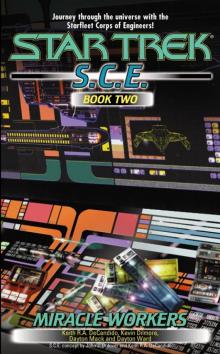 Miracle Workers
Miracle Workers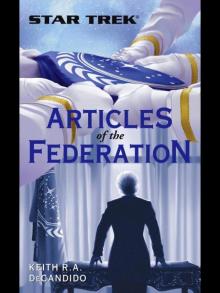 Articles of the Federation
Articles of the Federation Supernatural Heart of the Dragon
Supernatural Heart of the Dragon War Stories: Book Two
War Stories: Book Two The Zoo Job
The Zoo Job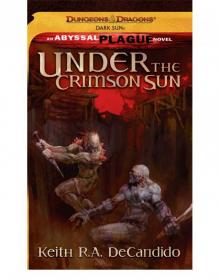 Under the Crimson Sun
Under the Crimson Sun Breakdowns
Breakdowns Mermaid Precinct (ARC)
Mermaid Precinct (ARC) Supernatural 1 - Nevermore
Supernatural 1 - Nevermore STAR TREK - The Brave and the Bold Book One
STAR TREK - The Brave and the Bold Book One Four Walls
Four Walls The Klingon Art of War
The Klingon Art of War Blackout
Blackout War Stories: Book One
War Stories: Book One The Brave and the Bold Book Two
The Brave and the Bold Book Two Honor Bound
Honor Bound Sleepy Hollow: Children of the Revolution
Sleepy Hollow: Children of the Revolution Worlds of Star Trek Deep Space Nine® Volume Three
Worlds of Star Trek Deep Space Nine® Volume Three Star Trek: TNG: Enterprises of Great Pitch and Moment
Star Trek: TNG: Enterprises of Great Pitch and Moment Genesis
Genesis Demons of Air and Darkness
Demons of Air and Darkness Star Trek - TNG - 61 - Diplomatic Implausibility
Star Trek - TNG - 61 - Diplomatic Implausibility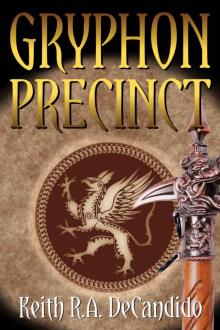 Gryphon Precinct (Dragon Precinct)
Gryphon Precinct (Dragon Precinct) THE XANDER YEARS, Vol. 1
THE XANDER YEARS, Vol. 1 Nevermore
Nevermore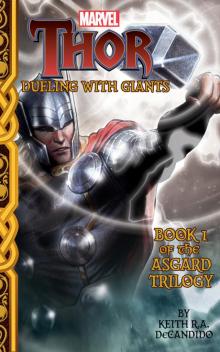 Thor
Thor The Brave And The Bold Book One
The Brave And The Bold Book One I.K.S. Gorkon Book Three
I.K.S. Gorkon Book Three STARGATE SG-1: Kali's Wrath (SG1-28)
STARGATE SG-1: Kali's Wrath (SG1-28) Bone Key
Bone Key Guilt in Innocece
Guilt in Innocece Star Trek - DS9 Relaunch 04 - Gateways - 4 of 7 - Demons Of Air And Darkness
Star Trek - DS9 Relaunch 04 - Gateways - 4 of 7 - Demons Of Air And Darkness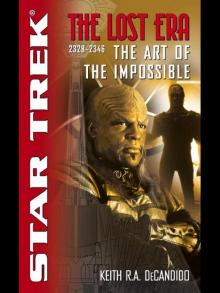 The Art of the Impossible
The Art of the Impossible I.K.S. Gorkon Book One: A Good Day to Die
I.K.S. Gorkon Book One: A Good Day to Die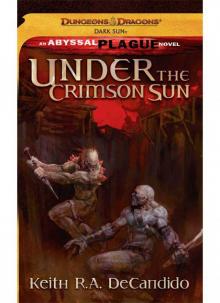 Under the Crimson Sun (the abyssal plague)
Under the Crimson Sun (the abyssal plague) DIPLOMATIC IMPLAUSIBILITY
DIPLOMATIC IMPLAUSIBILITY Tales from the Captain's Table
Tales from the Captain's Table A Burning House
A Burning House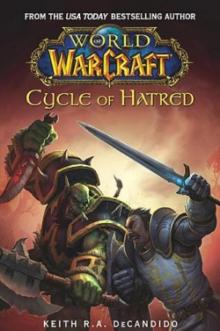 Cycle of Hatred (world of warcraft)
Cycle of Hatred (world of warcraft) Have Tech, Will Travel
Have Tech, Will Travel Security
Security